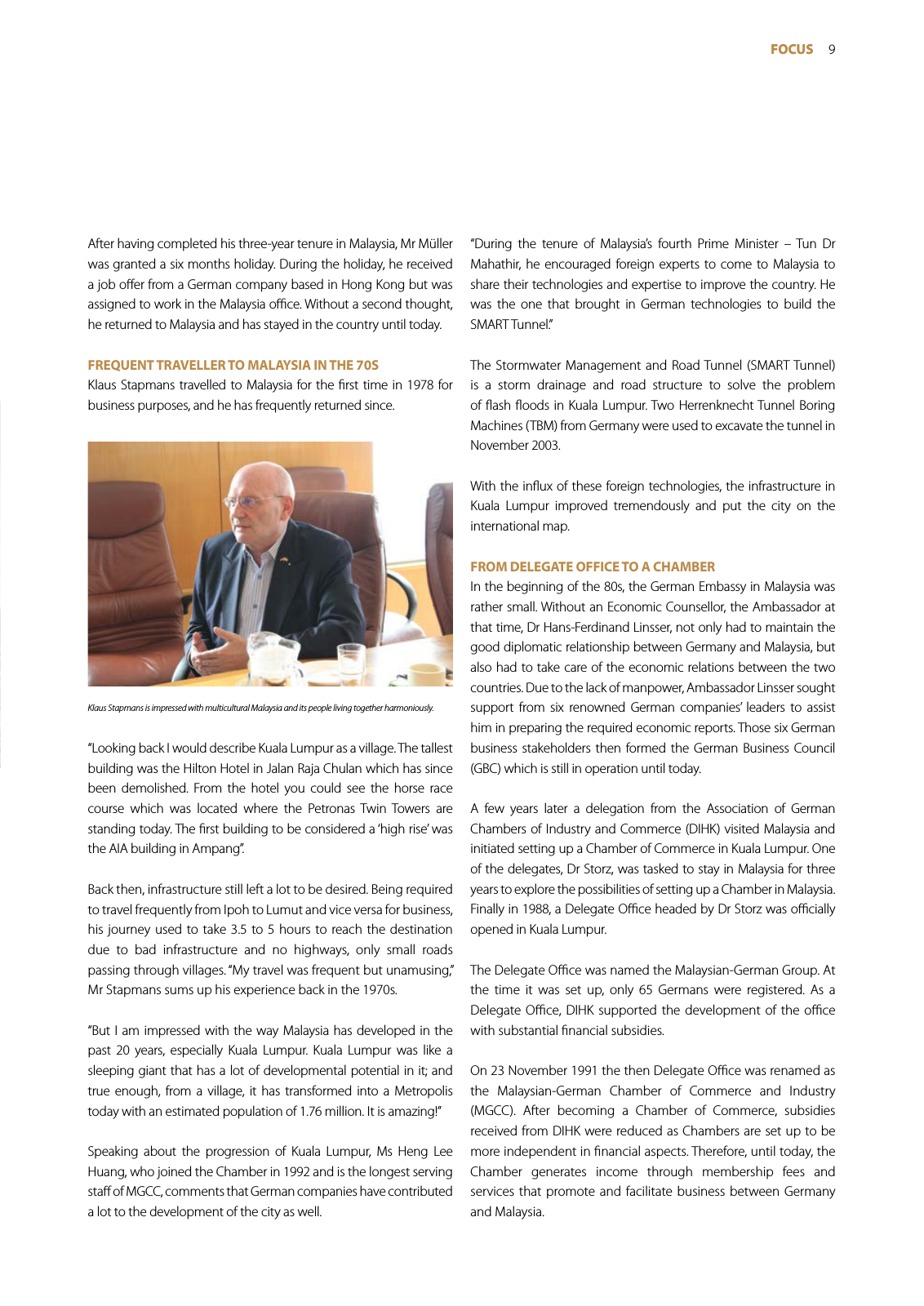9FOCUS After having completed his three year tenure in Malaysia Mr Müller was granted a six months holiday During the holiday he received a job offer from a German company based in Hong Kong but was assigned to work in the Malaysia office Without a second thought he returned to Malaysia and has stayed in the country until today FREQUENT TRAVELLER TO MALAYSIA IN THE 70S Klaus Stapmans travelled to Malaysia for the first time in 1978 for business purposes and he has frequently returned since Looking back I would describe Kuala Lumpur as a village The tallest building was the Hilton Hotel in Jalan Raja Chulan which has since been demolished From the hotel you could see the horse race course which was located where the Petronas Twin Towers are standing today The first building to be considered a high rise was the AIA building in Ampang Back then infrastructure still left a lot to be desired Being required to travel frequently from Ipoh to Lumut and vice versa for business his journey used to take 3 5 to 5 hours to reach the destination due to bad infrastructure and no highways only small roads passing through villages My travel was frequent but unamusing Mr Stapmans sums up his experience back in the 1970s But I am impressed with the way Malaysia has developed in the past 20 years especially Kuala Lumpur Kuala Lumpur was like a sleeping giant that has a lot of developmental potential in it and true enough from a village it has transformed into a Metropolis today with an estimated population of 1 76 million It is amazing Speaking about the progression of Kuala Lumpur Ms Heng Lee Huang who joined the Chamber in 1992 and is the longest serving staff of MGCC comments that German companies have contributed a lot to the development of the city as well During the tenure of Malaysia s fourth Prime Minister Tun Dr Mahathir he encouraged foreign experts to come to Malaysia to share their technologies and expertise to improve the country He was the one that brought in German technologies to build the SMART Tunnel The Stormwater Management and Road Tunnel SMART Tunnel is a storm drainage and road structure to solve the problem of flash floods in Kuala Lumpur Two Herrenknecht Tunnel Boring Machines TBM from Germany were used to excavate the tunnel in November 2003 With the influx of these foreign technologies the infrastructure in Kuala Lumpur improved tremendously and put the city on the international map FROM DELEGATE OFFICE TO A CHAMBER In the beginning of the 80s the German Embassy in Malaysia was rather small Without an Economic Counsellor the Ambassador at that time Dr Hans Ferdinand Linsser not only had to maintain the good diplomatic relationship between Germany and Malaysia but also had to take care of the economic relations between the two countries Due to the lack of manpower Ambassador Linsser sought support from six renowned German companies leaders to assist him in preparing the required economic reports Those six German business stakeholders then formed the German Business Council GBC which is still in operation until today A few years later a delegation from the Association of German Chambers of Industry and Commerce DIHK visited Malaysia and initiated setting up a Chamber of Commerce in Kuala Lumpur One of the delegates Dr Storz was tasked to stay in Malaysia for three years to explore the possibilities of setting up a Chamber in Malaysia Finally in 1988 a Delegate Office headed by Dr Storz was officially opened in Kuala Lumpur The Delegate Office was named the Malaysian German Group At the time it was set up only 65 Germans were registered As a Delegate Office DIHK supported the development of the office with substantial financial subsidies On 23 November 1991 the then Delegate Office was renamed as the Malaysian German Chamber of Commerce and Industry MGCC After becoming a Chamber of Commerce subsidies received from DIHK were reduced as Chambers are set up to be more independent in financial aspects Therefore until today the Chamber generates income through membership fees and services that promote and facilitate business between Germany and Malaysia Klaus Stapmans is impressed with multicultural Malaysia and its people living together harmoniously

Hinweis: Dies ist eine maschinenlesbare No-Flash Ansicht.
Klicken Sie hier um zur Online-Version zu gelangen.
Klicken Sie hier um zur Online-Version zu gelangen.